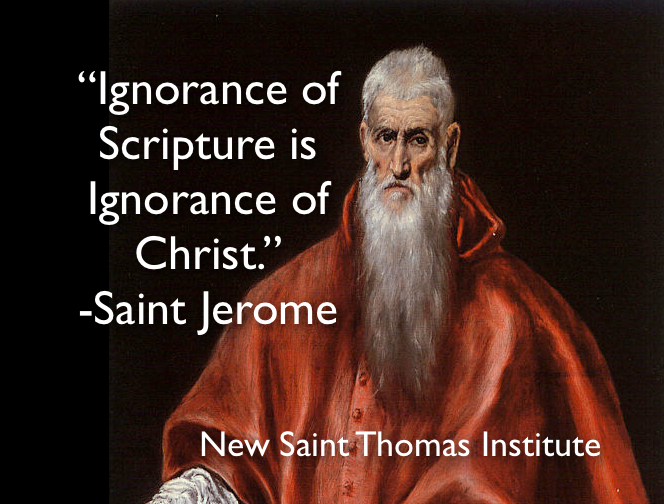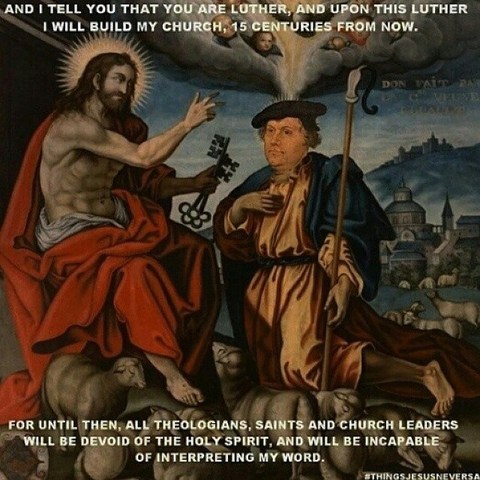OzSpen said:
This is false, Kepha, and you ought to know it if you read your Bible.
The Church is infallible, you ought to know it if you read your Bible. But the concept is almost impossible for the sola scripturist to grasp.
The apostle Paul taught it long before the Reformers. The Reformers discovered what the Scriptures taught: '8 For it is by grace you have been
saved, through faith—and this is not from yourselves, it is the gift of God— 9 not by works, so that no one can boast' (Eph 2:8-9 NIV)
The CC has been teaching Eph 2:8-9 for 2000 years. In post #411, I listed 6 scriptures showing that Paul was subject to the Church.
The reformers didn't discover anything, they invented a whole new religion. Their novel inventions have no apostolic roots. Granted, the revolt did spark the Church to make necessary reforms faster than what was already taking place. With one crisis after another, the Church is in a constant state of renewal. Sometimes she thinks in terms of centuries, not sound bytes.
This is false, Kepha, and you ought to know it if you read your Bible.
Infallibility, (in general) exemption or immunity from liability to error or failure; (in particular) in theological usage, the supernatural prerogative by which the Church of Christ is, by a special Divine assistance, preserved from liability to error in her definitive dogmatic teaching regarding matters of faith and morals.
The word "infallible" is not in scripture, but I have plenty of indications.
Isa. 35:8, 54:13-17 - this prophecy refers to the Church as the Holy Way where sons will be taught by God and they will not err. The Church has been given the gift of infallibility when teaching about faith and morals, where her sons are taught directly by God and will not err. This gift of infallibility means that the Church is prevented from teaching error by the power of the Holy Spirit (it does not mean that Church leaders do not sin!)
Acts 9:2; 22:4; 24:14,22 - the early Church is identified as the "Way" prophesied in Isaiah 35:8 where
fools will not err therein.
Matt. 10:20; Luke 12:12 - Jesus tells His apostles it is not they who speak, but the Spirit of their Father speaking through them. If the Spirit is the one speaking and leading the Church, the Church cannot err on matters of faith and morals.
Matt. 16:18 - Jesus promises the gates of Hades would never prevail against the Church.
This requires that the Church teach infallibly. If the Church did not have the gift of infallibility, the gates of Hades and error would prevail. Also, since the Catholic Church was the only Church that existed up until the Reformation, those who follow the Protestant reformers call Christ a liar by saying that Hades did prevail. If Hades did prevail, when did this monumentous event allegedly happen that no one noticed until the middle of a revolt?
Matt. 16:19 - for Jesus to give Peter and the apostles, mere human beings, the authority to bind in heaven what they bound on earth
requires infallibility. This is a gift of the Holy Spirit and has nothing to do with the holiness of the person receiving the gift.
Matt. 18:17-18 - the Church (not Scripture) is the final authority on questions of the faith.
This demands infallibility when teaching the faith. She must be prevented from teaching error in order to lead her members to the fullness of salvation.
Matt. 28:20 -
Jesus promises that He will be with the Church always. Jesus' presence in the Church assures infallible teaching on faith and morals. With Jesus present, we can never be deceived. When did Jesus go back on His promise? 1517???
Mark 8:33 - non-Catholics sometimes use this verse to down play Peter's authority. This does not make sense. In this verse, Jesus rebukes Peter to show the import of His Messianic role as the Savior of humanity. Moreover, at this point, Peter was not yet the Pope with the keys, and Jesus did not rebuke Peter for his teaching. Jesus rebuked Peter for his lack of understanding.
Luke 10:16 - whoever hears you, hears me. Whoever rejects you, rejects me.
Jesus is very clear that the bishops of the Church speak with
Christ's infallible authority. (not mere human authority)
Luke 22:32 - Jesus prays for Peter, that his faith may not fail. Jesus' prayer for Peter's faith is perfectly efficacious, and this allows Peter to teach the faith without error (which means infallibly). Did God not answer Jesus' prayer?
John 11:51-52 - some non-Catholics argue that sinners cannot have the power to teach infallibly. But in this verse,
God allows Caiaphas to prophesy infallibly, even though he was evil and plotted Jesus' death. God allows sinners to teach infallibly, just as He allows sinners to become saints. As a loving Father, He exalts His children, and
is bound by His own justice to give His children a mechanism to know truth from error.
1 & 2 Peter - for example, Peter denied Christ, he was rebuked by his greatest bishop (Paul), and yet he wrote two infallible encyclicals. (1&2Peter) Further, if Peter could teach infallibly by writing, why could he not also teach infallibly by preaching?
And why couldn't his successors so teach as well?
Gen. to Deut.; Psalms; Paul - Moses and maybe Paul were murderers and David was an adulterer and murderer, but they also wrote infallibly. God uses us sinful human beings because when they respond to His grace and change their lives, we give God greater glory and His presence is made more manifest in our sinful world.
John 14:16 - Jesus promises that the Holy Spirit would be
with the Church forever. The Spirit prevents the teaching of error on faith and morals. It is guaranteed because
the guarantee comes from God Himself who cannot lie.
John 14:26 - Jesus promises that the Holy Spirit would teach the Church (the apostles and successors) all things regarding the faith.
This means that the Church can teach us the right moral positions on such things as in vitro fertilization, cloning and other issues that are not addressed in the Bible. After all, these issues of morality are necessary for our salvation, and God would not leave such important issues to be decided by us sinners without His divine assistance.
John 16:12 - Jesus had many things to say but the apostles couldn't bear them at that point. This demonstrates that
the Church's infallible doctrine develops over time. All public Revelation was completed with the death of the last apostle, but the doctrine of God's Revelation develops as our minds and hearts are able to welcome and understand it. God teaches His children only as much as they can bear, for their own good.
John 16:13 - Jesus promises that the Spirit will "guide" the Church into all truth.
Our knowledge of the truth develops as the Spirit guides the Church, and this happens over time.
1 Cor. 2:13 – Paul explains that what the ministers teach is taught, not by human wisdom, but by the Spirit. The ministers are led to interpret and understand the spiritual truths God gives them over time.
Eph. 4:13,15 – Paul indicates that attaining to the unity of the faith and the knowledge of the Son of God to mature manhood is a process. We are to grow up in every way into Christ. Doctrine (which means “teaching”)
develops as we understand God’s Revelation.
Acts 15:27-28 - the apostles know that their teaching is being guided by the Holy Spirit.
He protects the Church from deception.
Gal. 2:11-14 - non-Catholics sometimes use this verse to diminish Peter's evident authority over the Church. This is misguided. In this verse, Paul does not oppose Peter's teaching, but his failure to live by it. Infallibility (teaching without error) does not mean impeccability (living without sinning). Peter was the one who taught infallibly on the Gentile's salvation in Acts 10,11. With this rebuke, Paul is really saying "Peter, you are our leader, you teach infallibly, and yet your conduct is inconsistent with these facts. You of all people!" The verse really underscores, and not diminishes, the importance of Peter's leadership in the Church.
Eph. 3:10 - the wisdom of God is known, even to the intellectually superior angels, through the Church (not the Scriptures). This is an incredible verse, for it tells us that God's infinite wisdom comes to us through the Church.
For that to happen, the Church must be protected from teaching error on faith and morals (or she wouldn't be endowed with the wisdom of God).
Eph. 3:9 - this, in fact, is a mystery hidden for all ages - that God manifests His wisdom through
one infallible Church for all people.
Eph. 3:20 - God's glory is manifested in the Church by the power of the Spirit that works within the Church's leaders. As a Father, God exalts His children to roles of leadership within the body of Christ.
Eph. 5:32- Paul calls the Church a "mystery." This means that the significance of the Church as the kingdom of God in our midst
cannot be understood by reason alone. Understanding the Church also requires faith. "Church" does not mean a building of believers. That is not a mystery. Non-Catholics often view church as mere community, but not the supernatural mystery of Christ physically present among us.
1 Thess. 5:21 - Paul commands us to test everything. But we must have something against which to test. This requires
one infallible guide that is available to us, and this guide is the Catholic Church,
whose teachings on faith and morals have never changed.
1 Tim. 3:15 - Paul says the apostolic Church (not Scripture) is the pillar and foundation of the truth. But for the Church to be the pinnacle and foundation of truth,
she must be protected from teaching error, or infallible. She also must be the Catholic Church, whose teachings on faith and morals have not changed for 2,000 years. God loves us so much that He gave us
a Church that infallibly teaches the truth so that we have the fullness of the means of salvation in His only begotten Son.
1 John 4:6 – John writes that whoever knows God “listens to us” (the bishops and successors to the apostles). Then John writes “This is the way we discern truth and error.
John does not say “reading the Bible is the way we discern truth and error.” But if listening to mere human beings helps us discern truth and error, God would have had to endow his chosen leaders with the special gift of infallibility,
so that they would be prevented from teaching error.
Matt. to Rev. - we must also note that not all Christian doctrines are explicit in Scripture (for example, the dogma of the Blessed Trinity). However, infallibility is strongly inferred from the foregoing passages. Non-Catholic Christians should ask themselves why they accept the Church's teaching on the three persons of the Trinity, the two natures of Christ in one divine person, and the New Testament canon of Scripture (all defined by the Catholic Church), but not other teachings regarding the Eucharist, Mary, the saints, and purgatory?
False inferences, Oz?





